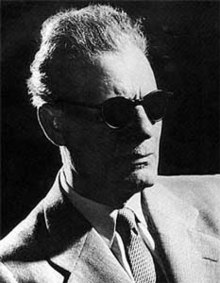Tāhā Husain
Tāhā Husain , better known as Taha Hussein ( Arabic طه حسين, DMG Ṭāhā Ḥusain ; * November 14, 1889 in Maghāghah ; † October 28, 1973 in Cairo ), is considered one of the most important and influential Arab writers of the 20th century . The first Arab Nobel Prize for Literature, Nagib Mahfuz , said Taha Hussein had earned the Nobel Prize before him . In fact, Taha Hussein was nominated for the Nobel Prize in 1949 and 1950, as was not known until many years later.
Life
Taha Hussein grew up in a humble family when he became blind as a toddler due to improper treatment of an eye condition. He was unable to complete his studies at the traditional Azhar , the only university in Egypt at the time, because he failed the exams (probably because of the difference of opinion with the conservative professors). He therefore moved to the newly founded University of Cairo , where he also came into contact with European professors. In 1914 he received his doctorate on Abu al-'Ala al-Ma'arri (973-1057), a blind poet of the Arabic classical period. Taha Hussein was the first to graduate from Cairo University.
After receiving his doctorate, he applied for a stay in France, which had to be postponed due to the outbreak of World War I. Finally, he studied for five years, first in Montpellier, then at the Sorbonne in Paris, where he again received his doctorate ( Doctorat d'État ) in 1919 on Ibn Chaldun's sociological view of Islamic society .
After his return to Egypt in 1919 he was a lecturer in ancient history at the University of Cairo, and later in Arabic literature . In publications he tried to implement the knowledge of modern scientific methods and theories that he had acquired in France. In 1923 he had a controversy with the Syrian intellectual Rafīq Bey al-ʿAzm (1865–1925) about the task of modern Arabic historiography. The starting point of the dispute was a series of essays on the history of Arabic literature, in which Tāhā Husain took the view that the age in which the Umayyad Empire fell apart and the Abbasid Empire emerged, "was an age of doubt, frivolity and cynicism". ʿAzm then accused Tāhā Husain of hasty, unjust judgments over the first centuries of Islamic history, which should be the pride of the Arabs. In his reply, Tāhā Husain accused ʿAzm of showing religious reverence to Islamic history , like many other scholars in the Orient , which made it impossible to view this history on the basis of criticism and genuine scientific research. He characterized excessive reverence for the heroes of history as a typical phenomenon in times of decadence. In order to understand history, he recommended the observance of two rules of Ibn Khaldūn , namely: 1. that people are all similar to one another, however time and place may differ, and 2. that people are all different from one another, how strong may also be the external characteristics of similarity. If one has understood this rule, then one knows that the age of the Abbasids, like every other age, also knew seriousness and firm belief, but also jokes and doubts.
Tāhā Husain campaigned for a reform of the Egyptian education system in the period that followed. Its goals were, for example, free training and the promotion of studies abroad. From 1950 to 1952 he was Minister of Education. He also worked as a translator and literary critic.
In 1973 he was posthumously awarded the United Nations Human Rights Prize.
Works
- al-Aiyām (“The Days”, 1926–1955), autobiography in three volumes, published in German as: Childhood days , youth years in Cairo , cosmopolitan between Cairo and Paris , Edition Orient , Meerbusch 1985–1989.
- Mustaqbal ath-thaqāfah fī Misr (“The future of culture in Egypt”), published in English in excerpts translation as: The Future of Culture in Egypt , American Council of Learned Societies, Washington 1954.
- On pre-Islamic poetry (1926), arab.
- On pre-Islamic literature (1927), arab.
literature
- Michael Fisch : He was a stranger back home. Introduction to the life and work of Tâhâ Hussein . In: "Science is a sea without banks". Contribution to the research colloquium at the Department of German Studies at Cairo University. Edited by Michael Fisch and Dalia Aboul Fotouh Salama. Berlin: Weidler 2017, pp. 11–26. (Contributions to transcultural science. Volume 4.) ISBN 978-3-89693-682-0 , and in the same way, see, man is truly lost. Essays on Quran and Islam research (2011–2019). Berlin: Weidler 2019, pp. 215–229 (= contributions to transcultural science. Volume 9). ISBN 978-3-89693-741-4
- Khalid al-Maaly and Mona Naggar: Lexicon of Arabic Authors of the 19th and 20th Centuries. Heidelberg: Palmyra 2004.
- Pierre Cachia: Article "Ṭāhā Ḥusayn". In: The Encyclopaedia of Islam. New Edition . Vol. X, pp. 95a-96b.
- Werner Ende : Arab Nation and Islamic History. The Umayyads as Judged by 20th Century Arab Authors. Beirut and Wiesbaden: Franz Steiner 1977. pp. 55–59.
- Pierre Cachia: Ṭāhā Ḥusayn. His place in the Egyptian literary renaissance . Luzac 1956.
Web links
- Literature by and about Tāhā Husain in the catalog of the German National Library
- Childhood in an Egyptian village, youth in Cairo - stories by Taha Hussain, a classic of modern Arabic literature
- nobelprize.org
Individual evidence
- ↑ Quotation at the end of 56.
- ↑ See end of 57.
- ↑ Quotation at the end of 59.
- ↑ See end of 59.
- ^ List of previous recipients. (PDF; 43 kB) United Nations Human Rights, April 2, 2008, accessed on December 29, 2008 (English).
| personal data | |
|---|---|
| SURNAME | Husain, Tāhā |
| ALTERNATIVE NAMES | Hussein, Taha |
| BRIEF DESCRIPTION | Arabic writer |
| DATE OF BIRTH | November 14, 1889 |
| PLACE OF BIRTH | Maghāghah |
| DATE OF DEATH | October 28, 1973 |
| Place of death | Cairo |
